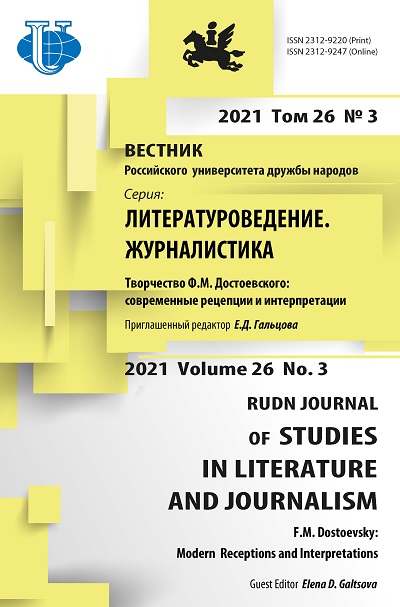Socialism and/or Christianity: F.M. Dostoevsky’s Influence on S. Lagerlöf's Novel Antichrist’s Miracles
- Authors: Andreichuk K.R.1
-
Affiliations:
- A.M. Gorky Institute of World Literature of the Russian Academy of Science
- Issue: Vol 26, No 3 (2021): F.M. DOSTOEVSKY: MODERN RECEPTIONS AND INTERPRETATIONS
- Pages: 490-500
- Section: LITERARY CRITICISM
- URL: https://journals.rudn.ru/literary-criticism/article/view/27650
- DOI: https://doi.org/10.22363/2312-9220-2021-26-3-490-500
- ID: 27650
Cite item
Full Text
Abstract
In the 1880s. F.M. Dostoevsky was perceived in Sweden as a revolutionary writer, therefore there was great attention to his political views, which influenced among others S. Lagerlöf, who read Dostoevsky in Swedish, Danish and, possibly, in French. In the novel Antichrist’s Miracles (1897) S. Lagerlöf talks about Italy, a Catholic country where the church has much more power than in Protestant lands. In this regard, Lagerlöf actualizes F.M. Dostoevsky’s reflections on the connection between the state and the church, presented in Brothers Karamazov and other novels. The key question that interests both F.M. Dostoevsky and S. Lagerlöf is whether people can build the kingdom of Christ on earth when Christ said: “My kingdom is not of this world”. F.M. Dostoevsky examines this problem in most detail in the unfinished article Socialism and Christianity , which S. Lagerlöf could not read, but she was undoubtedly familiar with Dostoevsky’s thoughts on this matter put into the mouths of Zosima and Prince Myshkin. In S. Lagerlöf's novel Antichrist’s Miracles , the main character becomes a socialist, though he dreamed of becoming a priest in childhood, like Alyosha Karamazov. A fake image of Christ with the words “My kingdom is only on earth” becomes a banner of socialism in Lagerlöf's novel. This image works wonders but only related to earthly goods. At the end of the novel, Lagerlöf comes to the conclusion (put into the mouth of the Pope) that this image should not be destroyed, but “the earth should be reconciled with heaven”. This conclusion is consistent with Dostoevsky’s ideas about the “universal church realized on earth”.
About the authors
Kseniia R. Andreichuk
A.M. Gorky Institute of World Literature of the Russian Academy of Science
Author for correspondence.
Email: enantiosemia@yandex.ru
ORCID iD: 0000-0002-8906-9607
Candidate of Philology, Senior Researcher
25a Povarskaya St, Moscow, 121069References
- Suhih, O.S. (2018). Artistic Embodiment of the Conflict of Idea and Nature in “Crime and Punishment” by F.M. Dostoevsky and the Works by S. Lagerlöf: “Outcasts”, “Mr. Arne’s Money”, “Excommunicated”. In Secrets of Mastery. Ethics, Religion, Aesthetics in the Work by Selma Lagerlöf (pp. 172–183). Moscow: RGGU. (In Russ.)
- Koblenkova, D.V. (2017). S. Lagerlöf’s Works and the traditions of Russian classical literature (the novel “The Portuguese Emperor”). In Russia and Scandinavia: Literary Interactions at the Turn of the XIX-XX centuries (pp. 313–322). Moscow: IMLI RAN Publ. (In Russ.).
- Ivanov, A.N. Selma Lagerlöf and Russian culture. Retrieved from: http://www.zpu-journal.ru/e-zpu/2008/5/Ivanov_Lagerlof/ (In Russ.)
- L’vovskij, A.O. (1999). “The Idiot” by F.M. Dostoevsky and Swedish Literature of the Early XX century. In Scandinavian Philology, (6), 158–165. (In Russ.).
- Nolin, B. (1965). Den gode europén. Studier i Georg Brandes’ idéutveckling 1871–1893. Uppsala: Almqvist & Wiksell. (In Swedish).
- Lagerroth, U.-B. (1963). Körkarlen och Bannlyst : motiv- och idéstudier i Selma Lagerlöfs 10-talsdiktning. Stockholm: Bonnier. (In Swedish).
- Dostoevsky, F.M. (2008). Idiot. Part Four. In Collected Works (Vol. 6, pp. 7–140). Moscow: Mir knigi, Literatura Publ. (In Russ.)
- Dostoevsky, F.M. (2008) Demons. Part two. In Collected works (pp. 7–204). Moscow: Mir knigi, Literatura Publ. (In Russ.)
- Dostoevsky, F.M. (2007). Brothers Karamazov. Moscow: Jeksmo. (In Russ.)
- Lagerlöf, S. (1924). From Death to Life. Transl. from Swedish by E.N. Blagoveshhenskoj. Petrograd: Izd-vo «A.F. Marks» Publ. (In Russ.).
- Lagerlöf, S. (1910). Complete Collection of Works. Vol. VI. Miracles of the Antichrist. Translated by V. Korsh. Moscow: Izdanie V. M. Sablina Publ. (In Russ.)
- Kolcheva, T.V. (2018). Dystopian Motives in Selma Lagerlöf's Novel “The Miracles of the Antichrist” and in “A Brief Story about the Antichrist” by the philosopher Vladimir Solovyov. In Secrets of Mastery. Ethics, Religion, Aesthetics in the Work of Selma Lagerlöf (pp. 159–171). Moscow: RGGU Publ. (In Russ.)
- Dostoevsky, F.M. (1980). Socialism and Christianity. In Complete Works (Vol. XX, pp. 190–194). Leningrad: Nauka Publ. (In Russ.)
- Lagerlöf, S. (1920). Antikrists mirakler. Stockholm: Bonnier. (In Swedish).
- Dostoevsky, F.M. (1984). The Writer’s Diary. In Complete Works (Vol. XXVII, pp. 5–40). Leningrad: Nauka Publ. (In Russ.)
Supplementary files















